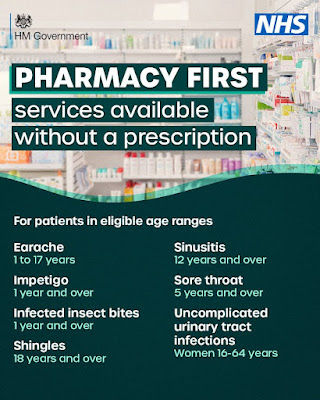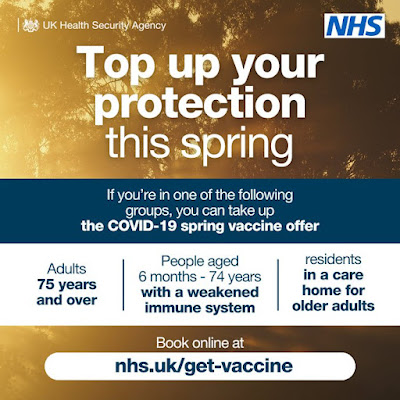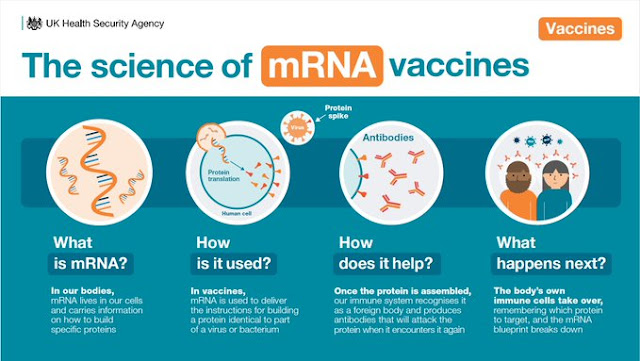COVID-19 Coronavirus and other virus UK and World News Update 26th April 2024
World COVID Statistics: 704,753,890 officially reported cases and 7,010,681 losses of life. And that is the last COVID statistics update. Very few countries still report, and even less test regularly, so it's far from accurate. Huge thank you to Worldometers dot info for keeping tally for the last 4 years.
"It's World Immunisation Week
Every minute, every day over the last 50 years, immunisation saved over 6 lives. It is one of humanity's greatest achievements.
Yet there’s more work to do. We’ve eradicated smallpox, it’s time now to eliminate malaria, polio, cervical cancer and more.
Nobody should suffer from a disease we know how to prevent.
It’s Humanly Possible."
The World Health Organisation
"Thanks to immunisation, a child born today is 40% more likely to see their fifth birthday than a child born 50 years ago.
And more and more lives are being saved as more and more diseases are becoming vaccine preventable, with newer vaccines against COVID-19, malaria, cholera, dengue, meningitis, RSV, Ebola and mpox, and more in development"
DrTedros, Head of WHO
In the UK those eligible for Spring boosters can now book their spring COVID 19 vaccine online or via the NHS app. Appointments started on 22nd April.
The list is not long, and eligible people are in the following 3 groups only:
- 75 years or over before 30th June 2024
- 6 months to 74 years old and have a weakened immune system
- live in a care home for older adults
Latest stats from the ONS (office for National Statistics) Winter Coronavirus Study (up to 7th March 2024) show 2 million people living in private households in England and Scotland self-report having long COVID.
This is "symptoms continuing for more than four weeks after a confirmed or suspected COVID19 infection that were not explained by something else".
People aged 45-54 are most affected. 1.5 million people say the symptoms adversely affect day-to-day activities. Over half (51.3%) say symptoms have persisted for over 2 years, and almost a third (30.6%) say they've had symptoms for at least 3 years.
Those figures are high, but likely lower than reality, as more than a third of the trial participants couldn't remember exactly when symptoms started or didn't provide a date.
The latest victim of the anti-vaxx movement is Whooping Cough, or more specifically the people who will catch it. My friend's daughter spent a week in Intensive Care last month with Whooping Cough. She had an organ transplant a couple of years ago and was particularly vulnerable, and very poorly. She is now home and well. These are the people who suffer the most from the lack of herd immunity - the ones who didn't actually choose not to vaccinate, including tiny babies and people with lowered immunity.
Whooping Cough naturally has a ripple every few years, and is currently sweeping through Europe in a particularly high wave. Since mid 2023 there have been fairly rapid increases in countries including Belgium, Croatia, Denmark, Spain, Sweden, Norway, the Czech Republic, the Netherlands, Greece and now the UK. Cases dropped a lot during COVID, but in a lot of areas are already at 2-4 or more times the total for the whole of last year (Spain had 1,200 cases in all of 2023, and 8,200 by March 2024). The UK is currently reporting around 150 new cases a week.
Whooping Cough is, as you'd expect, characterised by a loud whooping cough. It is caused by a bacteria entering the airways and when first infected it seems like a regular cold or hayfever, but the cough gets worse and can last for weeks or even months. It can become difficult to breathe, and young babies are especially at risk. It can also cause pneumonia, hernia, ear infection, dehydration and seizures. It is rarely fatal. Antibiotics can help during the first 3 weeks, after that the bacteria are mostly dead and you shouldn't be infectious, you just need a long time to repair and recover.
In much more positive news, the papers today are reporting on the beginning of Phase 3 final trials of personalised drugs to treat melanoma (skin cancer). This is really big news and it's become possible due to the rapid advances in mRNA technology over the last few years - a really good side effect from the pandemic.
Each jab has 34 possible neoantigens, and the correct combination is decided after DNA testing of a tiny sample of the patient's own tumour. It works in many ways like a vaccine, teaching your body what to look for and attack.
Skin cancer quite regularly returns, but the hope is that once your body learns the threat, it will remember it and be ready to beat it if it comes back - and the 2 earlier stages of trials have gone really well.
Used alongside immunotherapy drug pembrolizumab (Keytruda), after 3 years patients were only 49% (almost exactly half) as likely to have died or have their cancer return than patients who only received pembrolizumab.
This really is big news, and trials for other types of cancers (lung, bladder, kidney) are already underway.
This jab is being developed by Moderna and Merck Sharp and Dohme (MSD), and the worldwide trial is being led by University College London Hospitals NHS Foundation Trust (UCLH).
If everything goes well, it could be available to the public as early as next year, and they aren't the only ones using new technology to try to beat cancer. BioNTech and at least 2 other drugs manufacturers have trials underway for various cancers. The future looks hopeful, and although these drugs are likely to be expensive, if they work as well as they seem to, the cost will ultimately be far lower than current options.
Variant Watch
COVID variants have been pretty innocuous for a while now. On the horizon and growing in number are a couple of variants with distinct mutations that may allow them to take over and become predominant, but the mutations are ones we've seen before in other variants. It's highly unlikely they'll actually do much more than make a tiny wave or a ripple, especially as we are vaccinating our most vulnerable people with boosters right now.
Possibly most interestingly these mutations occur at positions labelled F, L, R and T, so they've earned the name "FLiRT mutations". They might look interesting at first and deserve some investigation, but spend some time with them and you'll find there's nothing serious about your relationship and move on.
The UK ONS (Office for National Statistics) have released figures relating to unpaid carers. This is a big issue, as it can prevent people from working, end careers, cause financial hardship and place huge stress on family members.
In 2020 to 2022, females can expect to spend:
▪️ at age 15 years, more of their remaining lives (7.6 years) providing unpaid care than males (5.3 years).
▪️ at age 50 years, 4.7 years of their remaining lives providing unpaid care (males 3.5 years).
1 in 4 unpaid carers feel they are not in good health themselves, and almost half report "adverse health effects" as a result of being a carer. Unpaid carers also attend A&E more often, and have lower mental wellbeing than people without caring responsibilities.
The more time you spend caring for others, the more you are affected.
Being a carer is relentless, it is hard work and it can be physically and mentally incredibly challenging. If you care for other adults, thank you for what you do. Remember to look after your own health. You are important, and you are saving the country an absolute fortune, but it shouldn't be at a cost which is too high for you.
I reported last time on the outbreak of H5N1 Avian Flu in US cattle herds. This continues, and we have some bad news from USDA APHIS (Animal and Plant Health Inspection Service).
"USDA has identified spread between cows within the same herd, spread from cows to poultry, spread between dairies associated with cattle movements, and cows without clinical signs that have tested positive. On April 16, APHIS microbiologists identified a shift in an H5N1 sample from a cow in Kansas that could indicate that the virus has an adaptation to mammals."
The US CDC (Centres for Disease Control and Prevention) have assessed risk to humans as unchanged, as this mutation has been seen before and didn't lead to disaster or make humans any more likely to become infected.
The USDA (United States Department for Agriculture) have now made reporting of any positive cattle mandatory, and all cattle being moved between states have to be tested.
Affected cattle are rarely very ill, and are not dying.
H5N1 can pass into milk, and tests show pasteurisation is killing any H5N1 present, although whenever infection is spotted, milk from the entire herd is destroyed.
In large part because a lot of cows have few or no symptoms, there are questions about how long this has been going on, and how widespread it is. Andrew Bowman, a veterinary epidemiologist at Ohio State University, has taken it upon himself to find out, and is focus of a really interesting article in Stat News. He collected 150 commercial milk products from midwest America, originating in 10 different states, and found dead particles of H5N1 in 58 of them. FDA testing is still ongoing, but it seems likely that they'll also find a much bigger issue than was first thought.
Advice remains the same - don't consume raw milk products, especially if you are in the United States.
Interestingly as soon as the USDA released genetic sequences for the H5N1 infections in cows, scientists have raced to get them onto Nextstrain dot org and have practically overnight created a family tree. Everything suggests they ALL originated from one single cow that was infected by a wild bird - they found patient zero. One infection that has already become many (tens of) thousands spread across the United States.
That's how easy it is, and why variant sampling for COVID or any other pathogen is a really important tool, and why movement of animals has to be taken seriously.
A Dutch gentleman aged 72 died late last year, after testing positive for COVID for 613 days in a row. It is believed to be the longest anyone has actively had COVID, and scientists have confirmed that around 50 different mutations occurred to the virus inside his body during his illness.
Almost beating a pathogen, but not quite, can be a very dangerous position to be in, as the surviving virus (or bacteria or other pathogen) have found a way past your defences, which means they can get past those of other people too. Mutations usually occcur because of errors when the virus replicates - like photocopies of a photocopy becoming less clear and collecting more lines and smudges as time goes on. Being ill for 613 days gave the COVID virus plenty of time to gather lots of errors, and can teach us a lot about how COVID can evolve, although at too high a cost for the gentleman involved.
The Dutch are doing some fantastic research and recently published in the International Journal of Infectious Diseases is a study which looked at who is most likely to develop Long COVID.
They studied 3,022 people, and 415 were classified as having Long COVID, even though over half of those people hadn't really considered themselves as suffering or had wondered but not been sure. Long COVID symptoms fell into 4 distinct groups.
- low symptom severity
- high symptom severity
- smell-taste and respiratory symptoms
- neuro-cognitive (memory, brain fog etc), psychosocial (depression, anxiety etc), and inflammatory symptoms
They found factors which made you more likely to develop Long COVID included:
- Western ethnicity
- high BMI (overweight)
- chronic disease
- COVID-19 reinfections
- COVID-19 severity
- Covid-19 symptoms
- lower self-esteem
- higher positive affect (this is lost in translation somewhat, but refers to people who'd say "I'm fine, tis but a scratch" and carry on even though really they should take time to rest and recover properly).
Nasal vaccinations for COVID are still progressing well, as are next generation vaccines which actively encourage your body to increase protection over time. Sadly they simply don't have the funding earlier vaccines were given, so it's looking like a possibility for next year, but highly unlikely this year.
Whenever someone questions how COVD vaccinations were rolled out so quickly compared to other new drugs and treatments - it is ALWAYS about the money.
More good news, especially if you are now topping up your vitamin D to help your immune system function well. Scientists at the Francis Crick Institute, the National Cancer Institute and Aalborg University in Denmark have found that in mice, vitamin D encourages the growth of a type of gut bacteria that improves cancer immunity and response to treatment. This was funded by Cancer Research UK, and when a database of Danish patients was examined, there appears to be a direct link between lower vitamin D levels and risk of cancer.
You get vitamin D naturally from sunlight, and can buy supplements cheaply over the counter - it is especially important to consider supplements if you have darker skin and/or don't live somewhere you can swan about in a bikini half the year.
Nature isn't stupid. People with naturally ginger hair can make some of their own vitamin D, and the greatest concentrations of redheads are in the Scotland, Liverpool and Manchester areas - where the amount of sunlight is lower than most of the UK.
Captain Tom's daughter doesn't want to live in her home any more now that it doesn't have a spa, so if you've got a spare £2.25m it can be yours - and you can recreate the Captain Tom NHS charity walkathon all day. I had naively thought he lived in a posh care home, but nope, that stately villa was actually just his own house. I'll take 3...
It's the weekend - and it is forecast to include some sunshine for most of us in the UK - hurrah! Exams have started here in Scotland, so best of luck to anyone taking theirs, including our second-to-youngest child. He's definitely earned his treat this weekend, so the pizzas and pop are in the fridge ready. Don't forget to treat yourself - life can be hard work, you need some fun too. It doesn't have to be expensive, it doesn't have to cost a thing, but it should be some time for you, doing something because you want to. You've earnt it.
I'll be back in a couple of weeks...
Play Outdoors, Top Up Your Vitamin D, Save The NHS...
.
.
.
Sources:
https://coronavirus.data.gov.uk/
https://ourworldindata.org/covid-vaccinations
Whooping Cough Pertussis Image
https://x.com/UKHSA/status/1782794335743860791?t=k7c528Jpq2HDEduQOxhwhA&s=09
Pharmacy first image
Long COVID images England and Scotland
https://twitter.com/ONS/status/1783418864954417185?t=ZsGM-n7CwnqsF3rBuZ6hhA&s=19
Dengue mosquito image
Covid boosters Image
https://x.com/UKHSA/status/1779872327385133350?t=m0zS83_PYirXa6yjaLvZHA&s=09
Covid boosters image
Metro Captain Tom Image
World Immunisation Week
https://x.com/WHO/status/1783020321152344434?t=6REQl8aGhW-6NU4L0zQ1BQ&s=09
Long COVID Figures England and Scotland
Covid boosters UK
Whooping Cough
https://www.nhs.uk/conditions/whooping-cough/
https://www.gov.uk/government/publications/notifiable-diseases-causative-agents-reports-for-2024/noids-causative-agents-week-16-week-ending-21-april-2024
https://www.mirror.co.uk/news/health/breaking-whooping-cough-outbreak-leaves-32513403
FLIRT mutations
MRNA cancer treatments
https://www.theguardian.com/society/2024/apr/26/cancer-mrna-vaccine-melanoma-trial
https://www.bbc.co.uk/news/health-68897731
Unpaid carers
https://x.com/ONS/status/1780880001828872233?t=n4BjO9zw5S-kqmcO66QlPg&s=09
Avian flu in cattle
Andrew Bowman H5N1
Avian flu in cattle original patient zero
https://twitter.com/LouiseHMoncla/status/1783555176575693082?t=HnntCSKl324i2qjeF09fsQ&s=19
Dutch man longest infection
https://x.com/nexta_tv/status/1781710099729232240?t=6Fq_TbZI5L4evqp4B8YPGg&s=09
Dutch study long COVID
https://x.com/iksnajleb/status/1781803512235467079?t=N03aDzvGBpevT7ct2dBvNA&s=09
Nasal vaccines
Vitamin D
https://www.crick.ac.uk/news-and-reports/2024-04-25_vitamin-d-alters-mouse-gut-bacteria-to-give-better-cancer-immunity








No comments:
Post a Comment
Thank you for taking the time to leave a comment. I read every one and try my best to reply!